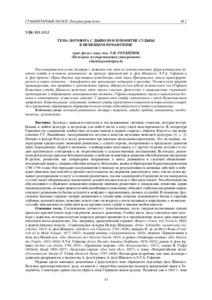Please use this identifier to cite or link to this item:
https://elib.psu.by/handle/123456789/16496| Title: | Тема договора с дьяволом и понятие судьбы в немецком романтизме |
| Authors: | Гордеёнок, Т. М. |
| Issue Date: | 2016 |
| Publisher: | Полоцкий государственный университет |
| Citation: | Вестник Полоцкого государственного университета. Серия A, Гуманитарные науки. - 2016. - № 2. – C. 53-57. |
| Abstract: | Рассматривается тема договора с дьяволом как одна из художественных форм воплощения понятия судьбы в немецком романтизме на примере произведений А. фон Шамиссо, Э.Т.А. Гофмана и А. фон Арнима. Образ Фауста переживает воздействие идей эпохи Просвещения, затем трансформируется в новую ипостась – Антифауста как воплощения недоверия к рассудку. Человеческая природа противоречива, что приводит к грехопадению (Арним, Шамиссо) или победе демонических сил (Гофман). Концепция судьбы Шамиссо включает идею поиска счастья, физических и нравственных страданий, представление о добровольном самоограничении личности. Гофман утверждает мысль о трагическом бессилии и иллюзорности человеческих надежд. У Арнима идея судьбы соотносится с идеей Божественного провидения. Концептуальное содержание понятия судьбы определяется конкретно-историческими условиями и принципами, образующими мировоззренческую основу гейдельбергского и позднего романтизма.=The article deals with the subject of the agreement with the devil as one of the art forms of the embodiment of the concept of destiny in German romanticism on the examples of works by A. von Chamisso, E.T.A.Hoffmann and J.von Arnim. The image of Faust endures the impact of the Enlightenment era, and then is transformed into a new form of Anti-Faust as the embodiment of mind distrust. Human nature is contradictory, that leads to the fall of man (Arnim, Chamisso), or the victory of demonic forces (Hoffmann). The concept of the Chamisso`s fate includes the idea of finding happiness, of physical and moral suffering, the idea of voluntary self-restraint of the individual. Hoffmann claims the idea of tragic impotence and illusive nature of human hopes. Arnim`s idea of fate corresponds to the idea of Divine providence. The conceptual content of the notion of fate is determined by specific and definite historical conditions and principles, forming the philosophical basis for Heidelberg and late Romanticism world outlook. |
| Keywords: | немецкий романтизм договор с дьяволом судьба свобода активность необходимость |
| URI: | https://elib.psu.by/handle/123456789/16496 |
| metadata.dc.rights: | open access |
| Appears in Collections: | 2016, № 2 |
Items in DSpace are protected by copyright, with all rights reserved, unless otherwise indicated.
